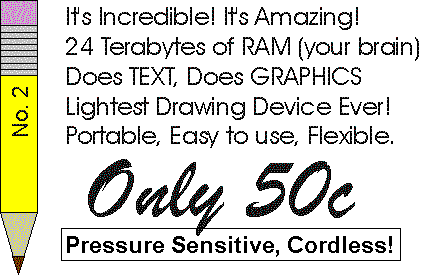 DRAWING FOR A LAB REPORT
DRAWING FOR A LAB REPORT |
CONTENTS | OVERHEADS | GLOSSARY | REFERENCES | SKILLS | DRAWING FOR A LAB REPORT
DRAWING FOR A LAB REPORT 9/3/97
>>>>TO DRAWING LESSON
What is the point of drawing anything anymore, we have cameras and video equipment for that now? Yes, and they are important pieces of scientific equipment, but there are some values to learning how to draw:
Develops hand - eye coordination
Teaches "seeing" skills by:
The concentration required to draw the image forces the student to focus on the details of the subject(s) drawn.
Sketching helps the student analyze, compare, contrast, etc.
A camera is not always available or practical (like one for each student, right!)
Can be low tech and cost efficient (pencil & paper)
Provides a means for the "visual" learners to:
express themselves
understand the point of the lesson
receive praise and reinforcement that they may not have had in more traditional assignments
Cameras cannot see everything. There are still times when a drawing can:
communicate essential details while leaving out distracting information
show hidden details (such as 3D structure that a 2D photo can not show)
emphasize point of focus
The scientist needs to be the artist as an artist will not always understand the science.
Drawing is a great way to illustrate a concept. Cartooning can to be used in student presentations.

Even for this web site, drawing has been essential. Lists were made of the criteria and essentials. Nearly ALL of the illustrations started as pencil and/or pen sketches, even the animations (story boards). ONLY then were the ideas developed on the computer. Most of the animations were then hand drawn using a mouse or drawing tablet.
We could have used time lapse video for everything, but:
MAJOR POINT
Most people don't regularly draw. That is probably the single biggest reason we do not use or grade drawing in science classes. If you want students to read, you have to model reading, show the students that this in important to you. The same is true of drawing.
An excellent book to help get you started drawing is now a classic:
Drawing on the Right Side of the Brain, by Betty Edwards, 254p, $14
"Your goal in drawing should be to encounter the reality of experience - to see ever more clearly, ever more deeply."
It contains very good lesson plans for all ages, including you! We can all learn to draw!
![]() THOUGHT: Maybe EVERY lesson should begin with either reading, writing, or drawing. Such activities can be used as warm-ups for the main lesson.
THOUGHT: Maybe EVERY lesson should begin with either reading, writing, or drawing. Such activities can be used as warm-ups for the main lesson.